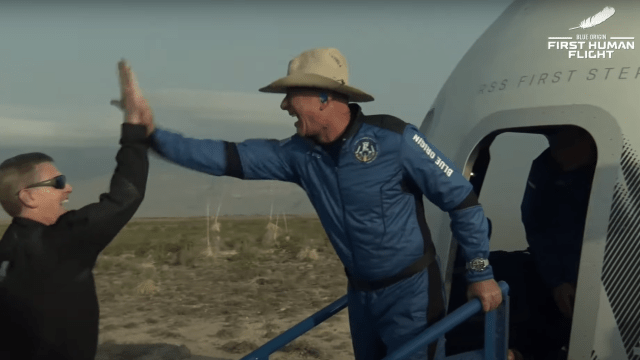Amazon employees and customers should be thrilled to know that the world’s richest man appreciates you for funding his little 10-minute rocket skydive (“space” travel) today. In a post-flight briefing this cowboy hat-wearing motherfucker actually said the quiet part out loud:
“I also want to thank every Amazon employee and every Amazon customer because you guys paid for all of this.”
Now thank him back for your high-paying jobs with many opportunities for career growth. Get back to work.
If, for no other reason than someone should have to pay for Jeff Bezos’s rebranding campaign from overlord-to-astronaut amidst a multi-billion-dollar space war with Elon Musk, it is time to consider a space tax.
Today, U.S. Rep. Earl Blumenauer (D-OR) presented the idea in a press release for the proposed Securing Protections Against Carbon Emissions (SPACE) Tax Act, remarking that “space exploration isn’t a tax-free holiday* for the wealthy.” (Holiday* lasting 1/144th of one day.) “Just as normal Americans pay taxes when they buy airline tickets, billionaires who fly into space to produce nothing of scientific value should do the same, and then some.” NASA missions intended to advance scientific knowledge would be exempt.
The proposal dovetails with Blue Origin’s numerous mid-mission announcements that ticket sales are open, and judging by the $US30 ($41) million bid by the New Shepard ticket auction winner (who ultimately chose not to join), rates will be pricey. As Business Insider has reported, Richard Branson’s Virgin Galactic plans to send people to the edge of space for $US250,000 ($341,125). Four people have paid $US55 ($75) million each for SpaceX’s considerably further 2-day journey, set for 2022.
Billionaires, salivating over their shot to poke their heads a couple miles into space and go “awesome,” do give back to the planet in pollution. Bezos’s booster runs on a mix of liquid oxygen and liquid hydrogen, materials don’t emit carbon when burned, but Gizmodo’s Dharna Noor has pointed out that generating liquid hydrogen often emits a ton of carbon. Branson’s fancy planes use hydroxyl-terminated polybutadiene (HTPB), the production of which likewise belches emissions.
While the damage caused by occasional launches is relatively minor, Blumenauer notes that Branson’s Virgin Galactic plans to launch flights every 32 hours.
The Act would levy “a per-passenger tax on the price of a commercial flight to space, like that for commercial aviation.” It would also charge a launch fee, which would be significantly higher if the trip exceeds 129 km above the Earth’s surface. (As Blue Origin has told us so many times, space is 100 km above sea level, above the height Richard Branson reached.)
Spacekeepers Jeff Bezos and Elon Musk more or less do not pay taxes but their rocket companies are happy to take the U.S. government’s money.
But such worldly thinking is not that of the enlightened spaceman. In what the Earthbound media described as a “press conference,” Jeff Bezos verbalcast a vague announcement about some kind of Blade Runner scheme for off-worlding industrial pollution. Gizmodo has some ideas about the currently limited logistical capacity for such an endeavour.
